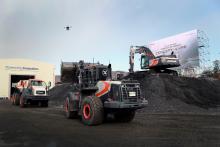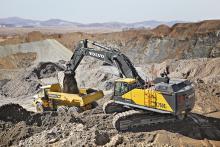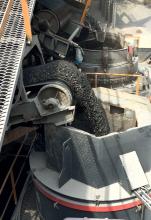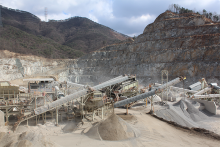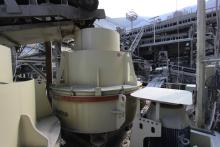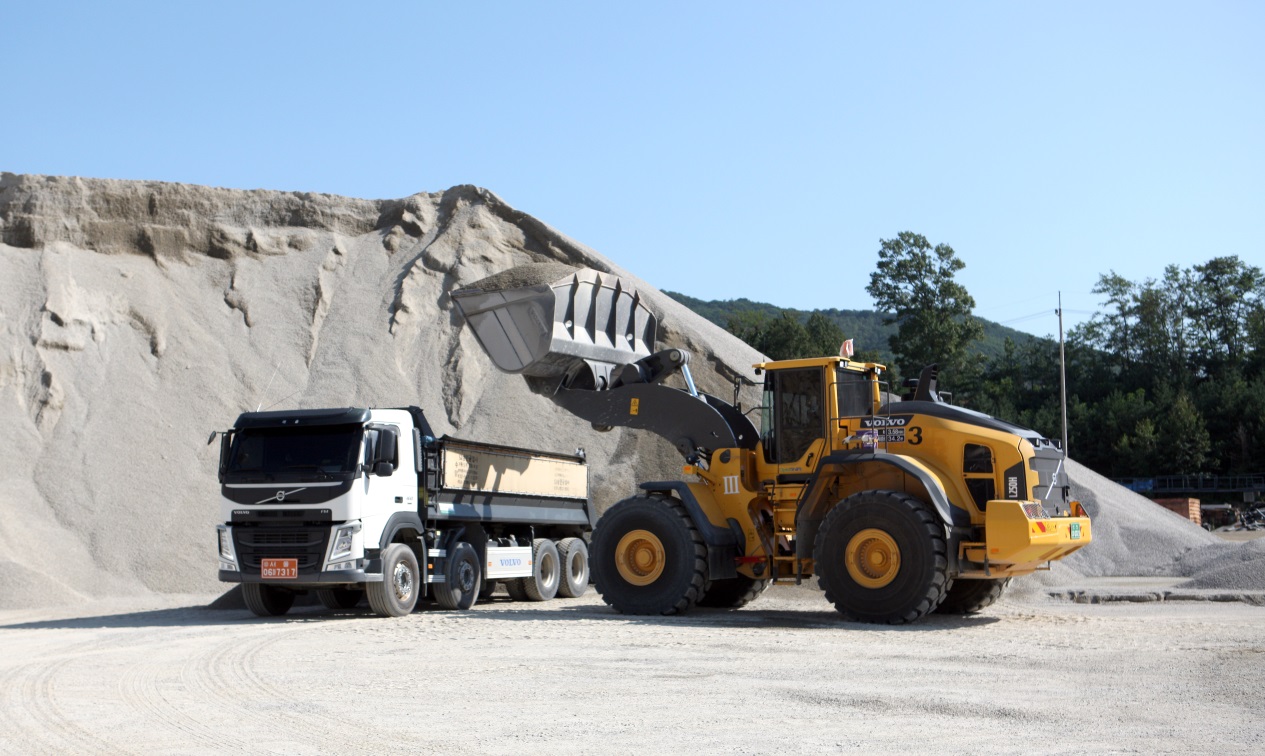
When a South Korean aggregates company was granted special permission to excavate granite from a restricted-access military area, an army of
Growing environmental awareness in South Korea has led to an increase in legislation and regulations in the construction industry for the development of new aggregates sites. A knock-on effect of this is that rather than new sites being opened, existing aggregates and recycling sites are expanding to meet growing demand. One such example is the Inwha-Li quarry, located on Ganghwa-Gun, an island just off the northwestern-most corner of South Korea. The quarry is situated on a site restricted for military use as it sits just a few kilometres from the North Korean shoreline.
In 1997, special permission was granted by the South Korean Forestry Administration to a leading South Korean aggregates company, Keunwoo, to excavate granite from the restricted-access area. The granite was needed to meet a growing demand for construction materials from the nearby cities of Incheon and Gimpo.
Keunwoo currently has 50 employees working at Inwha-Li quarry which spans more than 30,000m². Using Furukawa drills, holes are bored into the rock between 30 to 60 metres beneath the surface, and then filled with powder explosives and detonated. The final result is sand and gravel measuring between 25-75mm, destined for use in concrete production and road building. Inwha-Li produces between 4000-5000m3 of excavated material/day.
Equipment used to handle excavated material at aggregates sites in South Korea is divided into two camps. First, high-end premium products – including those manufactured by Volvo Construction Equipment. And second, lower cost, or value machines, many of which are built by smaller-sized domestic manufacturers. Keunwoo favours the premium option and it operates nine Volvo excavators, three H-series wheeled loaders, three articulated haulers and three crawler excavators at its operations.
According to figures from CAK (the Construction Association of Korea), construction investment in Korea in 2017 is expected to grow 3% versus 2016. Helping to drive this growth will be a number of SOC (Social Overhead Capital) projects that are scheduled to start this year. SOC projects are large infrastructure projects directed by the government, but built and operated with support from the private sector.
Aggregate excavated at the Inwha-Li quarry is already used on SOC projects in the cities of Incheon and Gimpo. Incheon borders the country’s capital of Seoul and is home to South Korea’s world-class international airport and over 2.8 million inhabitants. As the population steadily increases, demand for new housing is on the rise. “Overall the aggregates market in Korea depends heavily on housebuilding and the construction of smaller apartment blocks. But there is a good range of other projects that also contribute to demand,” says Byun ChunSub, CEO, Keunwoo.
Another SOC project is the construction of the new subway system in Gimpo, which will connect Han-River – a new city – with the country’s main domestic airport. The US$1.3 billion project is due for completion in 2018 and includes a 21km tunnel.
Equipment used to handle excavated material at aggregates sites in South Korea is divided into two camps. First, high-end premium products – including those manufactured by Volvo Construction Equipment. And second, lower cost, or value machines, many of which are built by smaller-sized domestic manufacturers. Keunwoo favours the premium option and it operates nine Volvo excavators, three H-series wheeled loaders, three articulated haulers and three crawler excavators at its operations.
According to figures from CAK (the Construction Association of Korea), construction investment in Korea in 2017 is expected to grow 3% versus 2016. Helping to drive this growth will be a number of SOC (Social Overhead Capital) projects that are scheduled to start this year. SOC projects are large infrastructure projects directed by the government, but built and operated with support from the private sector.
Aggregate excavated at the Inwha-Li quarry is already used on SOC projects in the cities of Incheon and Gimpo. Incheon borders the country’s capital of Seoul and is home to South Korea’s world-class international airport and over 2.8 million inhabitants. As the population steadily increases, demand for new housing is on the rise. “Overall the aggregates market in Korea depends heavily on housebuilding and the construction of smaller apartment blocks. But there is a good range of other projects that also contribute to demand,” says Byun ChunSub, CEO, Keunwoo.
Another SOC project is the construction of the new subway system in Gimpo, which will connect Han-River – a new city – with the country’s main domestic airport. The US$1.3 billion project is due for completion in 2018 and includes a 21km tunnel.
Inwha-Li Quarry excavates and crushes over 1,200,000m3 of granite/year. To keep up with that level of production, Keunwoo needs reliable equipment – including its excavators, haulers and wheel loaders from Volvo CE – to keep its site productive and profitable. With operations restricted to a maximum of 10 hours/day, downtime is not an option.
“We have always had confidence in Volvo excavators. We favor the EC480E excavator. It offers us the reliability and performance we need,” explains Myeong-Su Gu, director of administration at Keunwoo. “We were impressed when our Volvo dealer approached us to demonstrate the newly launched H-series loaders at our site. These machines were able to deliver fuel savings of up to 40 litres per day compared to the loaders we were using previously.”
As a result, in May 2015, Keunwoo invested in three new L250H wheeled loaders and Gu was soon pleased with his decision. “We quickly noticed that the L250H was able to fill a 25 tonne truck in just three loads, compared to the four loads it took our old models,” he says. “This increased loading capacity, boosted our site’s productivity and lowered our cost per tonne.”
The L250H features Z-bar linkage to provide high breakout force for powerful digging in hard materials. The high lift capacity enables fully loaded buckets to be elevated to maximum height – and combined with the fast hydraulic speeds the unit can deliver faster cycle times. “Our operators have noted the easy manoeuvrability of the loaders has led to shorter cycle times,” says Gu.
The machine also features several fuel-saving features including OptiShift – Volvo technology that combines the patented Reverse By Braking (RBB) system and a torque converter with lock-up. Together, these features help to eliminate power losses and reduce fuel consumption by up to 18%. In addition, the Eco pedal applies mechanical push-back force when the accelerator is used excessively and engine rpm is about to exceed the economic operating range.
In 2015, Tier 4-equivalent engine legislation was introduced in South Korea. Volvo CE was the first manufacturer in the country to make the switch to providing only Tier 4-rated equipment and has gradually seen greater adoption of machines with more modern engines.
Since 2015, Keunwoo has expanded its fleet to include three Volvo A40G articulated haulers, two EC480EL crawler excavators and an EC300EL crawler excavator. Powered by the latest Tier 4 Final Volvo 16 litre engine, the A40G can carry 39 tonnes while providing up to 10% more efficiency. The EC480EL’s and EC300EL also meet Tier 4 Final engine emission legislation and feature high torque at low rpm, reduced fuel consumption and increased productivity with faster cycle times.
“We have confidence in Volvo products, and have expanded our fleet throughout the years thanks to proven savings and increased productivity at the quarry,” says Byun ChunSub.
It will take two or three years for Keunwoo to pay back the sum it has invested in its fleet, but as increasingly strict regulations on the environment in South Korea take hold, it’s becoming more and more difficult to get licences on new quarry sites so it makes sense to invest sensibly to ensure the best possible output from an existing site, like Inwha-Li. With Volvo Construction Equipment machines on hand, Kuenwoo is doing just that.

